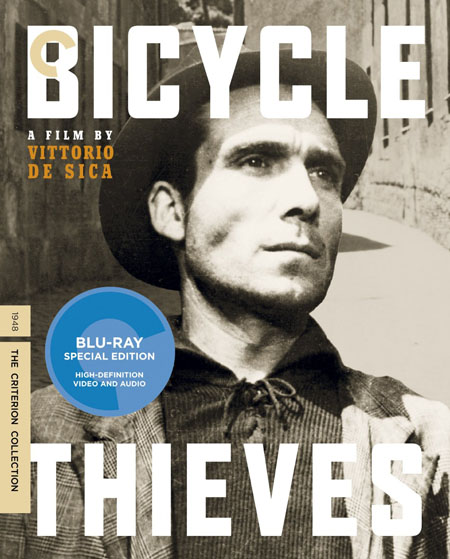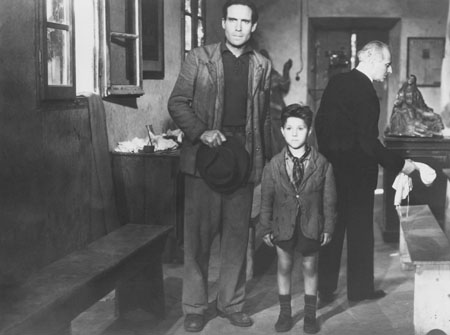
“THE CROWN JEWEL OF
ITALIAN NEO-REALISMâ€
By Raymond Benson
The
Criterion Collection released the wonderful Bicycle
Thieves on DVD in 2007 and now finally presents a marvelous new 4K digital
restoration of the Academy Award-winning picture (1950, Honorary Award for
Foreign Language Film) on Blu-ray. The movie was known in America for decades
as The Bicycle Thief—but the literal
translation of the Italian title is plural, and this also makes more sense in
the context of the film’s story. There is
more than one bicycle thief, and the revelation of the second one’s
identity is what gives De Sica’s picture its emotional power.
Italian
neorealism was a movement that lasted from 1945 to about 1952, and it was
highly influential for filmmakers around the world. There would not have been a
French New Wave in the early 60s had Italian neorealism not served as a
stylistic and thematic launching pad. Film scholars generally acknowledge
Roberto Rossellini’s Rome, Open City (1945)
as the first true Italian neorealist picture, for it presented a striking
naturalistic depiction of life among the lower class and the poor in post-World
War Two Italy. Strict realism had been attempted previously by other European
filmmakers (e.g., Jean Vigo’s L’Atalante),
but nothing had prepared the world for the harsh, yet affective, truthfulness
of Italian neorealism.
Stylistic
traits of the movement include working with extremely low budgets; shooting on-location
in the streets of war-torn cities often with hand-held cameras, creating a
documentary-like visual style; avoiding artifice in editing, camerawork, and
lighting in favor of a simple “style-less†presentation; using non-professional
actors in many cases; and adapting conversational, non-literary dialogue.
Thematically, the films focused on the plight of the poor and lower class as
they struggled to climb out of the horror that the world war had brought; a new
democratic spirit with emphasis on the value of “ordinary†people; a
compassionate point of view; humanism; and a focus on emotions rather than
abstract ideas.
Bicycle Thieves is an exemplary entry
of the movement; it is indeed the crown jewel. The story is simple—Antonio, a
poor man, finally gets a job that will pull his family, which consists of his
wife, his son Bruno (around eight or nine years old), and newborn baby, out of
poverty. But the job requires a bicycle that would enable Antonio to move
around Rome. All goes well for a day or so, until a thief steals the bike. For
the rest of the film, a desperate Antonio and Bruno scour the streets of the
city looking for the thief and the stolen bicycle, encountering a variety of
characters who try to help (or hinder) him. Yes, Pee-Wee’s Big Adventure was an homage of sorts to Bicycle Thieves.

De
Sica cast a shoe factory worker, Lamberto Maggiorani, as Antonio. For a
non-actor, his performance is exceptional. However, the real find was Enzo
Staiola as Bruno, who delivers arguably one of the greatest performances by a
child actor in the history of cinema. In many ways, the story is seen through
his eyes, and it is Bruno’s outlook of the world around him that defines the
film.
The
direction is masterful, as is the script, which was written primarily by De
Sica and frequent collaborator Cesare Zavattini, who was responsible for the
screenplays of several important Italian neorealism pictures. De Sica presents
the characters’ poverty with a matter-of-factness that ultimately hits home
when Antonio’s impulsive actions nearly result in tragedy. It may be a
depressing film, and one that will cause the viewer to shed a tear or two, but
in the end there is a statement of humanity that each of us will recognize.
The
new Blu-ray looks terrific, as is the gold standard for Criterion. The film
contains an uncompressed monaural soundtrack. The disk supplements from the
original DVD are ported over with nothing new added. They include: Working with De Sica, a fascinating
collection of interviews, including one with Enzo Staiola, who is now an old
man—and yet he still looks exactly like little Bruno!; Life As It Is, a piece on Italian neorealism with scholar Mark
Shiel; and a documentary from 2003 on screenwriter Zavattini. There is an
optional English-dubbed soundtrack. The booklet contains an essay by critic
Godfrey Cheshire, plus reminiscences by De Sica and his collaborators.
Bicycle Thieves is truly one of the great motion pictures. I screen it every semester for my Film History
class at the College of DuPage in Glen Ellyn, Illinois. The picture is required
viewing for anyone interested in world cinema and the movements that shaped
modern filmmaking.
CLICK HERE TO ORDER FROM AMAZON